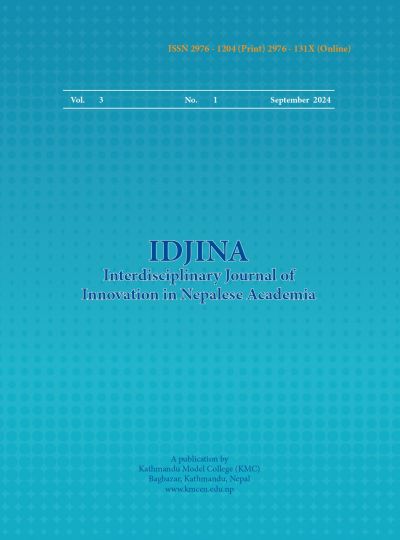The Bodhisattva in T. S. Eliot’s “The Waste Land”: A Journey through Spiritual Desolation
DOI:
https://doi.org/10.3126/idjina.v3i1.70306Keywords:
Buddha figure, Buddha nature, enlightenment, Mahayana Buddhism, redemptionAbstract
T.S. Eliot's seminal modernist poem "The Waste Land" has long been recognized for its intricate web of literary and philosophical allusions, including references to Mahayana Buddhism. This paper aims to examine the presence and significance of the Bodhisattva, a central figure in this tradition, within the poem. By leveraging Sallie B. King's theory of Buddha Nature (1992), which posits the inherent potential for enlightenment within all beings, this analysis seeks to shed new light on Eliot's portrayal of spiritual desolation, disillusionment and the quest for transformation. Through the lens of Buddha Nature, the fragmented characters and desolate landscapes depicted in "The Waste Land" are re-examined, revealing hidden layers that resonate with the notion of inherent enlightenment in apparent spiritual crisis. The paper explores how Eliot's engagement with Buddhist philosophy, as reflected through the concept of Buddha Nature, bridges eastern and western worldviews, offering a platform for cross-cultural dialogue and interpretation. By synthesizing King's scholarly insights with literary analysis, this paper sheds light on the transcendent potential embedded within the poem. It seeks to unravel Eliot's nuanced exploration of human suffering, the quest for enlightenment, and the interplay between spiritual emptiness and the inherent Buddha Nature. The Bodhisattva's commitment to guiding others toward enlightenment echoes the potential for transformation and renewal embedded within Eliot's desolate world. Through this analysis, the paper aims to contribute to the ongoing scholarly discourse surrounding Eliot's masterpiece, offering fresh perspectives on the poem's engagement with Buddhist philosophy and its universal themes of suffering, enlightenment and the human condition. By illuminating the presence and significance of the Bodhi-sattva and Buddha Nature in "The Waste Land", this paper hopes to inspire further exploration of the transcendent potential within Eliot's work and its enduring relevance in the modern world.
Downloads
Downloads
Published
How to Cite
Issue
Section
License

This work is licensed under a Creative Commons Attribution-NonCommercial-NoDerivatives 4.0 International License.
This license allows reusers to copy and distribute the material in any medium or format in unadapted form only, for noncommercial purposes only, and only so long as attribution is given to the creator.




